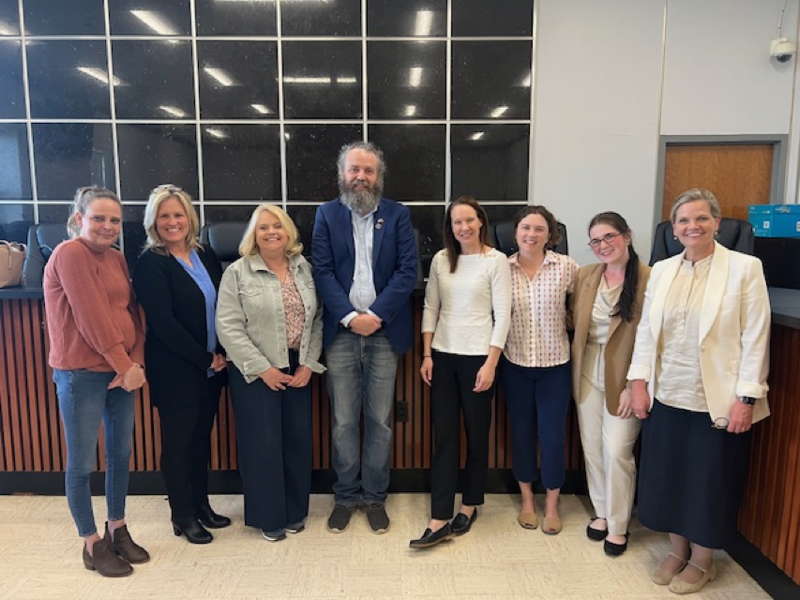County awards $425K in opioid grants

Anderson County commissioners, from left, Sabra Beauchamp, Denise Palmer, Shelly Vandagriff and Josh Anderson, and County Mayor Terry Frank, far right, are shown with UT SMART Initiative officials.
County Commissioner Shelly Vandagriff, who represents District 3 and serves as chair of the Anderson County Opioid Settlement Committee, organized a special presentation for the awardees during the committee’s meeting Tuesday, March 25.
Mayor Terry Frank and several other county officials attended the presentation.
The grant money came from Tennessee’s Opioid Settlement Fund, established by state law in 2021.
“Using the opioid settlement and remediation funds, we have the opportunity to support education and recovery programs serving our county, leading to improved outcomes for those suffering with addiction,” Vandagriff said.
“The organizations that received these funds are filling in the gaps in recovery support and prevention efforts in our county,” she said. “We were able to grant funds for transportation, housing, education and access to mental health care. I am excited to see the impact these grants will have on the future of Anderson County.”
The Anderson County Commission authorized the creation of the Opioid Settlement Task Force in 2023. Task force members — a small group of county commissioners — conducted several public sessions, including at least three town hall meetings throughout the county in 2023 and 2024.
The County Commission converted the task force into a full committee this year.
After hosting town halls and other sessions, and working with staff from the Anderson County Finance Department and the University of Tennessee, Knoxville, to create the application process, the committee launched an online portal to facilitate the grant applications.
Created by Anderson County Tourism Director Stephanie Wells, the portal was designed to accept applications from the community for the $427,444 in state opioid funds allocated to Anderson County.
The state plans to disburse varying amounts of funding to counties annually.
Jan. 31 was the application deadline for
the initial round of grants.
Upon review, committee members made funding recommendations to the Anderson County Budget Committee and the full County Commission.
Those recommendations were approved during the commission’s regular meeting March 17.
The following organizations will receive grant funds to support awareness, treatment and counseling, housing, transportation, drug disposal and peer-support programs in Anderson County:
• Free Medical Clinic: $81,648
• Foundation House: $60,000
• New Purpose: $45,000
• Anderson County Recovery Court: $65,000
• Main Street Baptist Church (Rocky Top): $20,000
• Boys & Girls Club: $30,000
• First Methodist Church (First Recovery): $18,500
• PPS & Focus Group Ministries: $35,000
• Allies for Substance Abuse Prevention (ASAP): $38,796
• Isaiah 117 House: $10,000
• Celebrate Recovery at Heritage: $13,500
• Anderson County Government Project Clean Out Your Medicine Cabinet: $10,000.
Each grant recipient must enter a contract, effective July 1, with the Anderson County government before spending the funds.
The county Finance Department will work with the University of Tennessee’s Substance Misuse and Addiction Resource for Tennessee Initiative to create a draft contract and finalize reporting parameters on program outcomes, impact and effectiveness.
According to its website, the UT initiative guides community leaders in “implementing evidence-based, cost-effective strategies to mitigate damage from substance use disorder and the opioid epidemic.”
The Tennessee General Assembly created the state’s Opioid Abatement Council through Public Chapter 491 to oversee disbursements from lawsuits related to opioid products.
The council is responsible for ensuring that funds are used for programs, strategies and initiatives that prevent and address opioid misuse and support treatment and recovery efforts.


